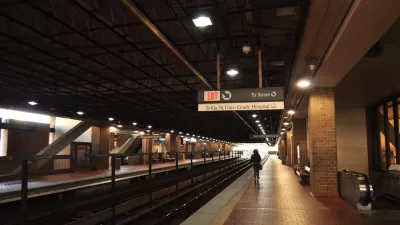After a ballot measure approved the Metropolitan Atlanta Rapid Transit Authority's (MARTA) expansion into a suburban county outside of Atlanta, the transit agency could set precedent on how to effectively adapt to sprawling suburbs.
In a 1971 referendum, Clayton County (an adjacent county south of Atlanta that houses the city's enormous airport) rejected MARTA's service, as its white residents feared the transit system would make it easier for blacks to reach their suburbs. However, four decades later, with Clayton County's bus service collapsing, 74 percent of the county's diverse, largely working-class voters approved a measure to join MARTA and pay for the service with a new sales tax.
As discussed on The Week by Jacob Anbinder, MARTA is the only transit agency in the country that does not receive state-government funding. Despite a growing population in the last four years, between 2010 to 2013, the agency saw a 6,000-person decline in transit commuters, the most of any American city.
Moreover, Atlanta's commuting patterns are not the typical hub-and-spoke style. Anbiner discusses how, "Atlantans need to go from suburb to suburb more than they need to go downtown. Four in five Clayton commuters work somewhere other than Atlanta; at the same time, four in five people who work in Clayton County don't live there. Like Atlanta's aptly named Perimeter Center Mall, the new center of MARTA's network may well be at the perimeter."
FULL STORY: How public transportation can adapt to suburban sprawl

Alabama: Trump Terminates Settlements for Black Communities Harmed By Raw Sewage
Trump deemed the landmark civil rights agreement “illegal DEI and environmental justice policy.”

Study: Maui’s Plan to Convert Vacation Rentals to Long-Term Housing Could Cause Nearly $1 Billion Economic Loss
The plan would reduce visitor accommodation by 25% resulting in 1,900 jobs lost.

Planetizen Federal Action Tracker
A weekly monitor of how Trump’s orders and actions are impacting planners and planning in America.

Wind Energy on the Rise Despite Federal Policy Reversal
The Trump administration is revoking federal support for renewable energy, but demand for new projects continues unabated.

Passengers Flock to Caltrain After Electrification
The new electric trains are running faster and more reliably, leading to strong ridership growth on the Bay Area rail system.

Texas Churches Rally Behind ‘Yes in God’s Back Yard’ Legislation
Religious leaders want the state to reduce zoning regulations to streamline leasing church-owned land to housing developers.
Urban Design for Planners 1: Software Tools
This six-course series explores essential urban design concepts using open source software and equips planners with the tools they need to participate fully in the urban design process.
Planning for Universal Design
Learn the tools for implementing Universal Design in planning regulations.
Caltrans
Smith Gee Studio
Institute for Housing and Urban Development Studies (IHS)
City of Grandview
Harvard GSD Executive Education
Toledo-Lucas County Plan Commissions
Salt Lake City
NYU Wagner Graduate School of Public Service





























